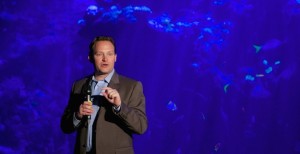“My motivation was to change the world.”
Dr. Paul Bunje has studied the life in the planet’s great oceans for many years. He has also done work on arguably the greatest challenge of our time, the issue of climate change. Now at XPRIZE he is heading up the Wendy Schmidt Ocean Health Competition, geared towards starting to solve the problems from the acidification of the oceans. He will be speaking at the Ocean Exploration: Illumination the Unknown panel to have an exchange on this and other issues concerning knowledge of the worlds oceans
“The opportunity to come to a place like XPRIZE was to incentivize action in the way we deal with environmental change,” Bunje said.
![]()
XPRIZE is known for incentivizing people to action on challenges through competitons to build technology that have or can lead to real world applications.
“Using the prize module to motivate people to bring about innovation that will help solve problems using science and technology to address a market failure,” Bunje said. “Since we don’t have the tools to solve many problems like ocean acidity.”
“It’s how I found my way here. Sort of changing the world and using science and technology to do so,” Bunje said.
No issue is more challenging then the health of our oceans. It is no small thing to say water is the source of all life on Earth. The oceans have the highest levels of biodiversity and are home to the oldest life on this planet. Human civilization has tied its fate to the oceans that hold the real wealth of the tiny speck we call home. According to NOAA (National Oceanic and Atmospheric Administration) 39 percent of the American people live in counties directly on the shoreline. We might be land animals, but we are a people of the sea.
Since the industrial revolution, the ocean equilibrium has been endangered through some of our actions.
“About a quarter of the CO2 we put in to the atmosphere gets absorbed by the world’s oceans,” Bunje said. “This mitigates some of the greenhouse effect, but it’s not great for the oceans because carbon dioxide forms carbonic acid. This means anything with a shell in the ocean is affected by this process.”
Oysters, coral, crustaceans, and plankton all are affected by this process since they all directly take in carbon to form their shells which protect these animals from the elements and predation in the sea.
“Changes in ocean acidity many be effecting other creatures at the very bottom of the food chain,” Bunje said.
Depending on how great of an affect the acidification is having on the bottom of the food chain will determine how the rest of life in the oceans, and in many ways all life on Earth, will be effected.
“To solve this problem XPRIZE took a look at how this might be done and saw the very first step has not been taken,” Bunje said. “This is to get the data on the acid levels so we know how bad the situation is. Without this information there can be no effective treatment of the problem.”
If the means to get the necessary data is invented, we could mitigate the acidification of the ocean. Getting the data is the first step and XPRIZE is incentivizing people from many different backgrounds and levels of education to solve it.
“We have 14 teams still competing, down from 77,” Bunje said. “All of those remaining are showing great promise and could be used from many different purposes. Some of these groups are professionals, others are college and high school groups.”
Assessments of the situation in the ocean could lead to new technology and actions that will better the health of the lowest parts of the food web and, in turn, the health of the rest of us.
“Everything we know about acidification is it’s very serious,” Bunje said. “This is based on averages and we need to know where it’s happening fastest, what creatures are affected, and what are the ramifications of these specific pieces of information.”
The facts on the ground, or the ocean floor, make no value statements, they simply tell you what is happening. What we do with this information is then up to us and the value we place on the planet that supports all life.
“We have to take the information we learn through the scientific process and make decisions based on our values and the information,” Bunje said. “We here at XPRIZE want to incentivize people to take important actions on things like ocean acidification and will make the effective clam it is an existential threat to both marine life and potentially many of the things we humans care and depend on.”
Oddly, in our time of technological juggernauts like NASA, MD Anderson, Apple, and the quantum computer D WAVE there are some who still doubt the body of evidence that says our home is changing, and that we are making it change.
XPRIZE hopes to help solve this problem as well, not by making everyone agree on anyone thing or issue, but by motivating people to make solutions to problems.
“People will refuse to believe there is a problem if they don’t think there is a solution,” Bunje said. “Climate change and the climate debate has suffered from this by fixating on the problem rather than calling out for a set of solutions which is what XPRIZE is doing.”
The future of XPRIZE is to serve as a targeted motivator for solutions concerning better batteries, alternative energy, and disease.
“We are in the process of designing many different alternative energy prizes,” Bunje said.
Humans have always needed a push. If our apathy, fear, or corruption holds us back from taking the plunge for change, then a little extra incentive is where XPRIZE has found a niche and will keep stepping in to promote solutions to change the world.
“We are excited to incentivize people to explore the oceans because they’re cool and it’s really an opportunity to tackle some of the grand challenges of the 21st century.”


